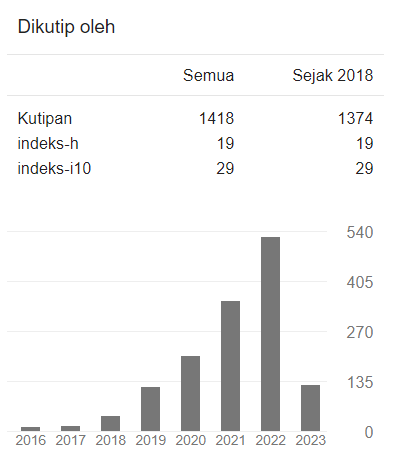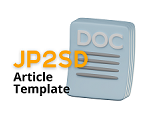Analisis Nilai Karakter Gotong Royong pada Film Animasi A Bug’s Life
DOI:
https://doi.org/10.22219/jp2sd.v11i1.25443Keywords:
Animated Film , Mutual Cooperation, Character education, A Bug’s LifeAbstract
Education is a service that must be taken and accepted by every human being. The main objective of instilling primary education in children is to develop children's intelligence, personality, character and personality to produce children with noble characters. This study aimed to analyze the value of the cooperation character depicted in the animated film A Bug's Life. The method used in this study was descriptive qualitative with analysis content. The data was obtained from the animated film A Bug's Life. This study employed a documentation technique. Data analysis was done by reducing data, presenting data, and drawing conclusions. The assessment technique to check the validity of the data was a credibility test with techniques of extending observations and increasing perseverance. The findings showed that the animated film A Bug's Life has seven sub-values of cooperation characters. They are (1) Cooperation with the type of activities of collecting food together, creating and flying artificial birds; (2) Helping with the type of activities of helping friends who experience a disaster, such as getting lost, falling, and saving baby ants from the blaze; (3) Empathy with activities of empathizing with friends who are crushed by leaf stems, falling, and tumbling over; (4) Positive dependence on activities of assisting friends who need help; (5) Concern with social care activities with the attitude of caring about the life of the lives of creatures around them and caring for the damaged environment; (6) Solidarity with the activity of assisting friends who are facing problems; (7) Deliberation with an activity of finding a way out to fight the evil grasshopper mob
Downloads
References
Amalia, N., Siagian, N., Riani, L., Faradila, I., Wulandari, N., & Rambe, U. K. (2021). Keaktifan Gotong Royong Berpengaruh Meningkatkan Interakasi Sosial dan Menumbuhkan Rasa Solidaritas di Desa Siamporik. Edumaspul: Jurnal Pendidikan, 5(2), 75–80. https://ummaspul.e-journal.id/maspuljr/article/view/2052
Ansori, R. A. M. (2016). Strategi Penanaman Nilai-Nilai Pendidikan. Jurnal Pusaka, 8, 14–32. https://doi.org/https://doi.org/10.35897/ps.v4i2.84
Astuti, E. W., Afifah, N., & Rouzi, K. S. (2021). Nilai – Nilai Pendidikan Karakter dalam Film Doraemon Serta Relevansinya dengan Psikologi Perkembangan Anak Usia Sekolah Dasar. Jurnal of Indonesian Elementary School and Education, 1(1). https://doi.org/http://dx.doi.org/10.21927/ijnd.2020.8
Asyya, A., & Suparno. (2022). Analisis Nilai-Nilai Pendidikan Karakter Pada Film Animasi Riko The Series. At-Thufuly: Jurnal Pendidikan Anak Usia Dini, 2(2), 104–110. https://doi.org/https://doi.org/10.37812/atthufuly.v2i2.589
Ayunina, I. (2019). Tujuan Pendidikan Islam Dalam Membangun Karater Siswa Di Era Digital. Risalah, Jurnal Pendidikan Dan Studi Islam, 5(2), 1–19. https://doi.org/https://doi.org/10.31943/jurnal_risalah.v6i1.106 TUJUAN
Bahtiyar, Y., Lina, Samsudin, & Ichans, A. S. (2021). Pengaruh Film Animasi Upin dan Ipin Terhadap Karakter Gotong Royong Siswa Madrasah Ibtidaiyah. Jurnal of Integrated Elementary Education, 1(1), 18–27.
Birhan, W., Shiferaw, G., Amsalu, A., Tamiru, M., & Tiruye, H. (2021). Exploring the context of teaching character education to children in preprimary and primary schools. Social Sciences & Humanities Open, 4(1), 100171. https://doi.org/10.1016/j.ssaho.2021.100171
Cheung, C. kiu, & Lee, T. yan. (2010). Improving social competence through character education. Evaluation and Program Planning, 33(3), 255–263. https://doi.org/10.1016/j.evalprogplan.2009.08.006
Elwijaya, F., Neviyarni, & Irdamurni. (2021). Sistem, Nilai, dan Norma dalam Pendidikan Dasar : Sebuah Kajian Literatur. Jurnal Pendidikan Tambusai, 5(1), 1840–1845. https://www.jptam.org/index.php/jptam/article/view/1186
Emalasari, N. P. A., & Wulandari, I. G. A. A. (2022). Penerapan Pembiasaan Tri Hita Karana untuk Meningkatkan Pendidikan Karakter Gotong Royong Siswa SD. Jurnal Ilmiah Universitas Batanghari Jambi, 22(3), 1560–1566. https://doi.org/10.33087/jiubj.v22i3.2578
Fatriyah, F., Adhi Prasetyo, S., & Ardiyanto, A. (2020). Daya Tangkap Siswa Terhadap Pesan Moral Dan Nilai Karakter Pada Film Animasi Moana. Jurnal Ilmiah Pendidikan Profesi Guru, 3(2), 303. https://doi.org/10.23887/jippg.v3i2.28994
Frimayanti, A. I. (2018). Implementasi Pendidikan Nilai Dalam Pendidikan Agama Islam. Al-Tadzkiyyah: Jurnal Pendidikan Islam, 8(2), 227. https://doi.org/10.24042/atjpi.v8i2.2128
Ghojaji, A. D., Eramansyah, M. G., Putri, R. E., Istianah, S., Kusmawati, W. E., Asbari, M., & Purwanto, A. (2022). Pancasila Based Character Education to Form Good and Smart Citizens. Journal of Community Service and Engagement (JOCOSAE), 2(4), 11–18. http://jocosae.org/index.php/jocosae/article/view/62/47
Ghoniyah, I., Nita, C. I. R., & Yuniasih, N. (2021). Pengembangan E-Ensiklopedia Berbasis Pendidikan Karakter Gotong Royong Pada Siswa Kelas IV SD. Seminar Nasional PGSD UNIKAMA, 5(1), 271–279. https://conference.unikama.ac.id/artikel/
Hardianti, D., Martati, B., Dian, K., & Afiani, A. (2021). Analisis Kegiatan Ektrakurikuler Pramuka dan Nilai Gotong Royong Siswa SD Pacar Klingi 1 Surabaya. Inventa: Jurnal Pendidikan Guru Sekolah Dasar, 5(1), 59–70. http://jurnal.unipasby.ac.id/index.php/jurnal_inventa
Harismatullah, E. W. D. (2022). Analisis Nilai Pendidikan Karakter Dalam Film Animasi Diva The Series Serta Relevansinya Bagi Anak Usia Sekolah Dasar [UNIVERSITAS ISLAM NEGERI SUNAN AMPEL SURABAYA]. http://digilib.uinsby.ac.id/
Khasanah, N. (2013). Pengembangan Budaya Gotong Royong. Edukasi, 01(01), 092–108.
Kholilia, W., Purbasari, I., & Hilyana, F. S. (2022). Nilai-Nilai Sosial dalam Cerita Film Upin Ipin Tema Pesta Cahaya. Jurnal Ilmiah Ilmu Pendidikan (2614-8854), 5(3), 690–697. http://jiip.stkipyapisdompu.ac.id
Kristinawati. (2021). Nilai Pendidikan Dalam Film Nkcthi ( Nanti Kita Cerita Tentang Hari Ini ) Karya Angga Dwimas Sasongko : Kajian Sosiologi Sastra. Bapala, 8(3), 114–124. https://ejournal.unesa.ac.id/index.php/bapala/article/view/40170
Kurniawan, M. I. (2013). Integrasi Pendidikan Karakter Ke Dalam Pembelajaran Kewarganegaraan Di Sekolah Dasar. Jurnal Pemikiran Dan Pengembangan Sekolah Dasar (JP2SD), 1(1), 37. https://doi.org/10.22219/jp2sd.v1i1.1528
Miles, M. B., & Huberman, A. M. (1994). Qualitative data analysis: An expanded sourcebook. Sage.
Mulyadi, B. (2020). Early childhood character education in japan. E3S Web of Conferences, 202. https://doi.org/10.1051/e3sconf/202020207063
Nuha, S. U., Ismaya, E. A., & Fardani, M. A. (2021). Nilai Peduli Sosial Pada Film Animasi Nussa dan Rara. Jurnal Riset Pendidikan Dasar, 04(1), 17–23. http://journal.unismuh.ac.id/index.php/jrpd%0ANILAI
Nuryani, A. R., & Murdianto. (2019). Nilai-Nilai Pendidikan Karakter Peduli Sosial Dalam Film Animasi Upin dan Ipin ( Musim Sembilan Tajuk Kedai Makan Upin Dan Ipin ). Qalamuna : Jurnal Pendidikan, Sosial, Dan Agama, 11(2), 35–43. https://doi.org/https://doi.org/10.5281/zenodo.3559277
Octaviani, J. N., Utaminingsih, S., & Masfu’ah, S. (2022). Pembentukan Sikap Peduli Sosial Anak Pada Masa Pandemi Covid 2019 Di Desa Pringtulis, Jepara. Jurnal Inovasi Penelitian, 2(10), 3453–3462. https://doi.org/https://doi.org/10.47492/jip.v2i10.1343
Purnomo, F. S. (2016). Analisis Nilai – Nilai Pendidikan Karakter Dalam Film Upin Dan Ipin Produksi Les Copaque Tahun 2010. Diksa : Pendidikan Bahasa Dan Sastra Indonesia, 2(2), 142–149. https://doi.org/10.33369/diksa.v2i2.3411
Putri, R., Murtono, & Ulya, H. (2021). Nilai - Nilai Pendidikan Karakter Film Animasi Upin dan Ipin. Jurnal Educatio, 7(3), 1253–1263. https://doi.org/10.31949/educatio.v7i3.1401
Rasyid, H. (2015). Membangun Generasi Melalui Pendidikan Sebagai Investasi Masa Depan. Jurnal Pendidikan Anak, 4(1), 565–581. https://doi.org/10.21831/jpa.v4i1.12345
Rochmadi, N. (2012). Menjadikan Nilai Budaya Gotong-Royong Sebagai Common Identity dalam Kehidupan Bertetangga Negara-Negara ASEAN. 1–9.
S.Nasution. (1988). Metode Penelitian Naturalistik Kualitatif. Tarsito.
Saleh, M. (2021). Impelementasi Pendidikan Karakter Di Sekolah Inklusi. Hikmah: Journal of Islamic Studies, 17(2), 101–108. http://journal.alhikmahjkt.ac.id/index.php/HIKMAH/article/view/198
Satria, R., Adiprima, P., Wulan, K. S., & Harjatanaya, T. Y. (2022). Projek Penguatan Profil Pelajar Pancasila. In Panduan Pengembangan (pp. 1–126).
Sayekti, O. M. (2019). Film Animasi “ Nussa dan Rara Episode Baik Itu Mudah ” sebagai Sarana Penanaman Karakter pada Anak Usia Dini. Jurnal Pendidikan Anak, 8(2), 164–171. https://journal.uny.ac.id/index.php/jpa
Selfiana. (2017). Degradasi Nilai Gotong Royong Pada Lingkungan Sekolah (Studi kasus SMA Somba Opu). Universitas Muhammadiyah Makassar.
Shafira, Z., Pratiwi, H., & Samdani. (2022). Analisis Pendidikan Karakter Anak Usia Dini Pada Tayangan Film Kartun Cloud Bread. Jurnal Pendidikan Dan Pembelajaran Anak Usia Dini, 07(01), 31–39. https://doi.org/10.24903/jw.v7i1.832
Shim, J. (2023). Investigating the effectiveness of introducing virtual reality to elementary school students’ moral education. Computers & Education: X Reality, 2(January), 100010. https://doi.org/10.1016/j.cexr.2023.100010
Sujana, I. W. C. (2019). Fungsi Dan Tujuan Pendidikan Indonesia. Adi Widya: Jurnal Pendidikan Dasar, 4(1), 29. https://doi.org/10.25078/aw.v4i1.927
Sukitman, T. (2016). Internalisasi Pendidikan Nilai Dalam Pembelajaran (Upaya Menciptakan Sumber Daya Manusia Yang Berkarakter). Jurnal Pendidikan Sekolah Dasar, 02(02), 86–96. https://core.ac.uk/download/pdf/324200457.pdf
Ulpah, E. M., Putri, M. A., & Badriah, L. (2021). Nilai-Nilai Pendidikan Karakter Dalam Film Monster University. Jurnal of Indonesian Elementary School and Education, 1(1). https://doi.org/http://dx.doi.org/10.21927/ijnd.2020.8
Wahid, Z., & Juhdi, M. (2018). Makna Gotong Royong Dalam Kosmologi Permukiman Tanean Lanjhang Di Madura Sebagai Penguatan Nilai Kebangsaan Dan Nasionalisme. Jurnal Pendidikan Seni, Bahasa Dan Budaya, 1(1), 11–20. http://ejournal.elbinajatim.id/index.php/jpsb/article/view/4
Downloads
Published
Issue
Section
License
Copyright (c) 2023 Sagita Rima Pramesti , Muhamad Taufik Hidayat

This work is licensed under a Creative Commons Attribution-ShareAlike 4.0 International License.
Authors who publish with Jurnal Pemikiran dan Pengembangan Sekolah Dasar (JP2SD) agree to the following terms:
- For all articles published in Jurnal Pemikiran dan Pengembangan Sekolah Dasar (JP2SD), copyright is retained by the authors. Authors give permission to the publisher to announce the work with conditions. When the manuscript is accepted for publication, the authors agree to automatic transfer of the publishing right to the publisher.
- Authors retain copyright and grant the journal right of first publication with the work simultaneously licensed under a Creative Commons Attribution-ShareAlike 4.0 International License that allows others to share the work with an acknowledgment of the work's authorship and initial publication in this journal.
- Authors are able to enter into separate, additional contractual arrangements for the non-exclusive distribution of the journal's published version of the work (e.g., post it to an institutional repository or publish it in a book), with an acknowledgment of its initial publication in this journal.
- Authors are permitted and encouraged to post their work online (e.g., in institutional repositories or on their website) prior to and during the submission process, as it can lead to productive exchanges, as well as earlier and greater citation of published work (See The Effect of Open Access).

This work is licensed under a Creative Commons Attribution-ShareAlike 4.0 International License.


















